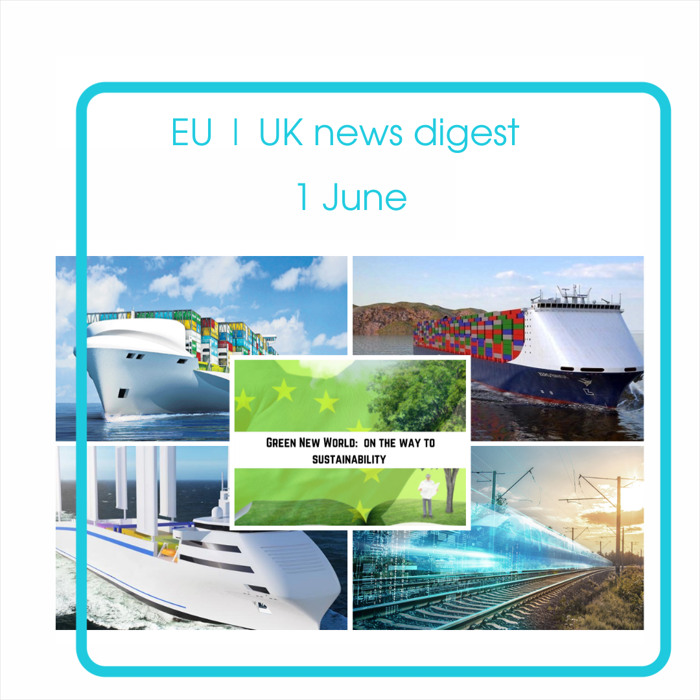EU | UK news digest. 1 June
The growing demand for sustainable services encourages logistics companies to expand their green initiatives that can provide significant competitive advantage in the future.
The new week starts with an announcement of the new rates from the Mediterranean and North Europe directions to several destinations worldwide that will come in force starting from 1 July. Living up to the expectations of the experts, the figures have demonstrated a significant increase in prices. To illustrate: the rates from Mediterranean base ports to US East Cost have gone up from $3,550 for 20’ to $4,050 and a similar situation occurred with 40’ – the price increased by $2,400 from $4,050 to $6,450. North Europe followed suit with the prices ranging from $3,125 for 20’ to $8,350 for 20’RF and from $5,500 to $15, 700 for 40’RH containers depending on the destination point.
The “green initiative” to reduce CO2 emissions keeps unfolding in Europe and these days, finds its continuation in the question of whether there is should be one predominant technology or it is the variety that will be a key to success. It seems like the answer is the latter. Although there is a clear consensus that electrification will become the dominant technology for light-duty vehicles, and that strong policy measures are required to encourage their uptake, it is admitted that electrified vehicles are not the only way to meet sustainable transportation goals. It is not evident why electrified vehicles should have a technology monopoly. A new European policy framework is aimed at creating a fair completion between technologies. In this case, the primary step for the EU Commission's common view of 2030 sustainable targets should be the review of the nature of the current vehicle CO2 methodology concerning the net-zero 2050 objectives. In the light of the aforementioned objective, the logistics companies are also advocating for additional measures, bringing up the necessity of a carbon tax. During the World Economic Forum, it was revealed that the world’s largest liner has now contracted a yard to build a ship running on green fuel. Since it is becoming possible to impose regulations that will create a global level sustainable field, a carbon tax is starting to make sense. The “green” development is also backed by the customers. To address the future energy demands of stakeholders the Port of London Authority (PLA) will conduct a study on the Themes River to estimate which technology will be better to implement - Liquefied Natural Gas (LNG), hydrogen, biofuels, or electricity-powered operations. French company Nestle is bringing more trains to the rails for the transport of reusable water bottles to and from the production site as a part of its “Glass Train” project. The objective is to reach carbon neutrality and reduce its transport emissions by 13% by 2022 in alignment with the EU sustainable targets. The initiative is getting two more destinations: Arles in Southern France and Merrey in the country’s East.
There is a growing demand for container services that have been launched recently between Dublin and Amsterdam facing North European shipping companies. In response to it, Samskip has introduced a larger, faster ship with the capacity of the 750TEU and added a call at Port of Waterford. The service is expected to become a game-changer.
Austrian company Rail Cargo Group teams up with Pasifik Eurasia in the joint efforts to start a new collaboration focused on rail transport along the New Silk Road. There is already a developed network connecting the Halkali terminal in Istanbul with Budapest and Köseköy. From now on, with Pasifik Eurasia’s help, all trains will reach the Asian side of Turkey, where the Köseköy terminal is positioned. The priority of both companies is to optimize their supply chains and explore new opportunities by connecting their networks in Europe and Asia.
Another expansion concerns the new railway line of the East-West Gate in Hungary. It connects the intermodal terminal on the border of Hungary and Ukraine with the standard gauge network of Europe. The site is planned to become the largest in Europe (1 mil TEUs capacity), operate with 5G, and be empowered by green technology.
The Slovenian government will invest €4.4 million (US$5.4 million) to construct a new gate for trucks at the port of Koper, which will be the third entrance to it. The initiative is partly funded by the EU project called Napa4Core and is accompanied by another investment in the major Slovenian port – a new garage and a petrol station. However, not all Balkan countries are doing successfully in terms of the development of their infrastructure. Montenegro’s first motorway should have been completed in 2020 but corruption allegations, construction delays, and environmental tragedies have slowed the process down. Chinese financial participation is also contributing to instability: since Montenegro chose Chinese loan for construction, Chinese managers have been accused of ignoring basic EU standards of environmental protection, rule of law, and transparency.
A tragic event occurred at Port of Castellon in Spain on Friday, May 28. The 1986-built 1,600 dwt general cargo ship Nazmiye Ana owned by Turkey’s Sinop Shipping capsized during cargo loading operations. Local media is reporting that one of the ship’s crew has been found dead and another two injuries that were sustained in the incident, with one of the injured in a serious condition and currently in ICU.
Green New World: EU logistics on the way to sustainability

